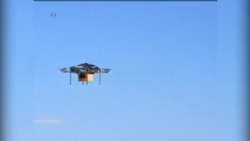U.S. regulators have approved the first use of commercial drones in the United States, giving an industry that is expected to create thousands of jobs and reap billions of dollars a step forward. The unmanned aerial vehicles, or UAVs, will inspect oil facilities in remote Alaska. But it's just the first step toward creating rules intended to maintain safety in crowded skies while still allowing entrepreneurs to create a whole new industry.
Camera drones can create stunning videos, giving viewers the sensations of effortless flight.
Creating such pictures for movies or television once required expensive manned aircraft. But rapidly improving computers, software, communications and electronics - along with much experimentation by entrepreneurs - means an unmanned vehicle costing a few thousand dollars can do the job and perform a fast-growing number of other tasks. Online retail giant Amazon is experimenting with drones to deliver packages.
The University of California, Davis is experimenting with Japanese drones to spray insecticide, in the hope that it will be more precise and cheaper than manned aircraft or ground operations.
The head of the Association for Unmanned Vehicle Systems International Michael Toscano hopes U.S. officials will soon make rules that allow these and other drones to operate safely away from other planes - and allow this infant industry to blossom and grow.
“In the first three years there would be over $13.6 billion of economic benefit and about 70,000 new jobs," he said.
Experts say the drone industry involves small entrepreneurs as well as large technology companies and is growing at an exponential rate.
The head of drone company Team BlackSheep, Raphael Pirker, says his work is maturing from an entertaining hobby to a serious business.
“Now it’s getting more to the point where business is getting involved and the bottom line matters," he said. "They will calculate the cost of, for example, a film crew in a real helicopter versus a film crew with a drone and the benefits of that, how good is the picture quality."
A key expert says companies will find more and more uses for smaller, relatively inexpensive drones, and those new ways of doing business may change our society.
“It just makes a difference, a significant difference, not necessarily a revolution in the way we organize society," said Professor Keith Hayward of the Royal Aeronautical Society in London Hayward.
Military unmanned vehicles are built and operated by the United States and many other nations. They have played a controversial role in spying and fighting wars. In many cases, military UAVs resemble combat aircraft in their complexity, large size and multi-million-dollar costs.
Most commercial drones evolved from radio-controlled model aircraft. They are relatively cheap, usually weigh a kilogram or so, and are more likely to carry a package or a pizza than a bomb.
Camera drones can create stunning videos, giving viewers the sensations of effortless flight.
Creating such pictures for movies or television once required expensive manned aircraft. But rapidly improving computers, software, communications and electronics - along with much experimentation by entrepreneurs - means an unmanned vehicle costing a few thousand dollars can do the job and perform a fast-growing number of other tasks. Online retail giant Amazon is experimenting with drones to deliver packages.
The University of California, Davis is experimenting with Japanese drones to spray insecticide, in the hope that it will be more precise and cheaper than manned aircraft or ground operations.
The head of the Association for Unmanned Vehicle Systems International Michael Toscano hopes U.S. officials will soon make rules that allow these and other drones to operate safely away from other planes - and allow this infant industry to blossom and grow.
“In the first three years there would be over $13.6 billion of economic benefit and about 70,000 new jobs," he said.
Experts say the drone industry involves small entrepreneurs as well as large technology companies and is growing at an exponential rate.
The head of drone company Team BlackSheep, Raphael Pirker, says his work is maturing from an entertaining hobby to a serious business.
“Now it’s getting more to the point where business is getting involved and the bottom line matters," he said. "They will calculate the cost of, for example, a film crew in a real helicopter versus a film crew with a drone and the benefits of that, how good is the picture quality."
A key expert says companies will find more and more uses for smaller, relatively inexpensive drones, and those new ways of doing business may change our society.
“It just makes a difference, a significant difference, not necessarily a revolution in the way we organize society," said Professor Keith Hayward of the Royal Aeronautical Society in London Hayward.
Military unmanned vehicles are built and operated by the United States and many other nations. They have played a controversial role in spying and fighting wars. In many cases, military UAVs resemble combat aircraft in their complexity, large size and multi-million-dollar costs.
Most commercial drones evolved from radio-controlled model aircraft. They are relatively cheap, usually weigh a kilogram or so, and are more likely to carry a package or a pizza than a bomb.





